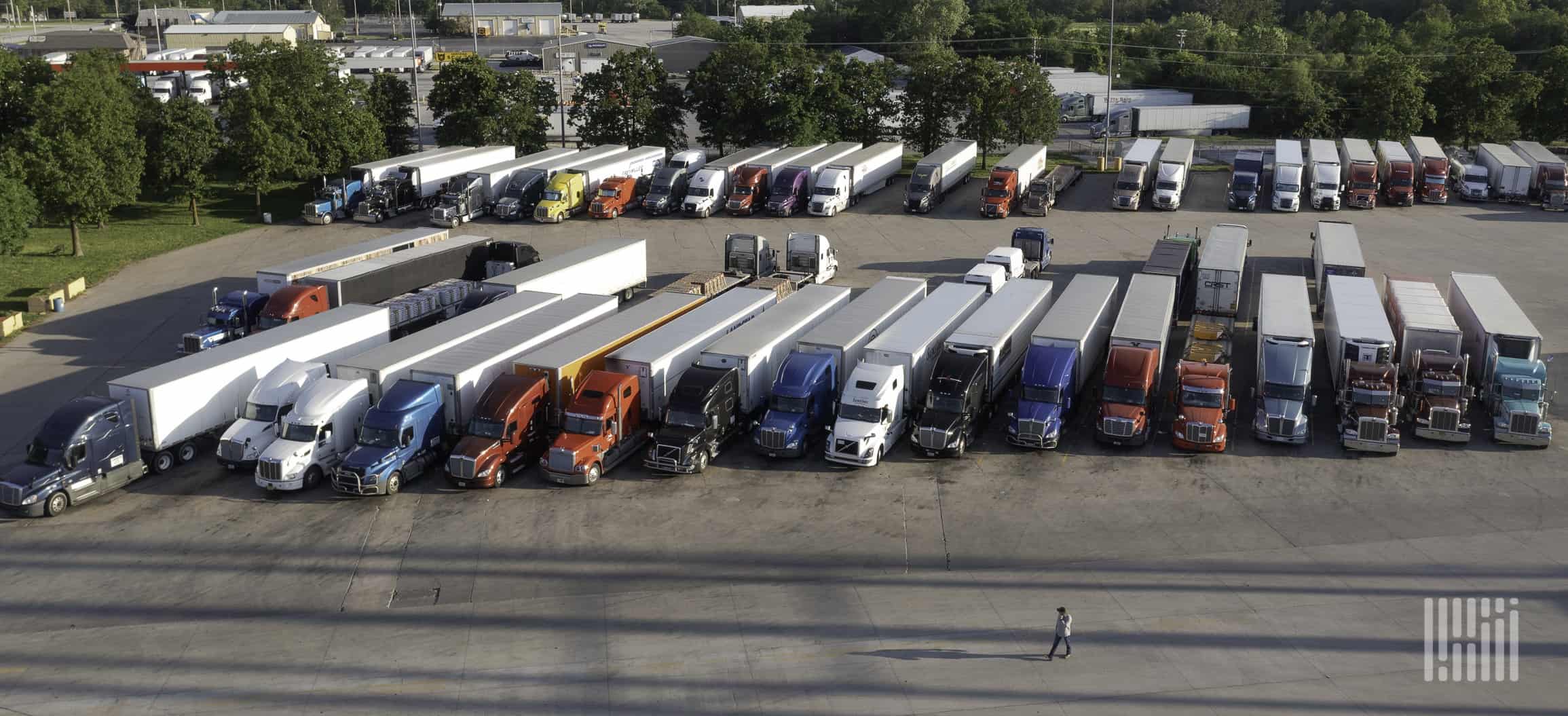Efficient fleet management is crucial for success. Fleet management systems have emerged as powerful tools that can transform how companies operate their vehicle fleets. These comprehensive solutions offer a wide array of benefits that go far beyond simple vehicle tracking.
From optimizing routes and reducing fuel costs to enhancing driver safety and streamlining maintenance, fleet management systems are revolutionizing the way businesses handle their mobile assets.
In this article, we’ll delve into the key benefits of a fleet management system and explore how it can transform your fleet operations, drive efficiency, and bolster your bottom line.
What is fleet management?
Fleet management is the process that companies use to organize and coordinate work vehicles with the aim to improve efficiency, reduce costs, and ensure compliance with regulations. This practice is commonly used by businesses that rely heavily on transportation, including courier services, utility companies, public transportation providers, and more.
At its core, fleet management involves a wide range of functions, such as vehicle maintenance, telematics tracking, driver management, speed management, fuel management, and health and safety compliance. These operations are often coordinated using fleet management software, which provide real-time data and insights to help manage the fleet more effectively.
This real-time data, gathered through a telematics system, can include information such as vehicle location, fuel consumption, and driver behavior. This allows fleet managers to maximize the efficiency of their fleet utilization, plan routes more effectively, and ensure regular fleet maintenance.
In essence, fleet management is a comprehensive approach to managing all aspects of a company’s vehicle fleet, aiming to improve operational efficiency, ensure safety, and minimize costs. With the help of modern fleet management technologies, this process has become significantly more streamlined and efficient.
Example of how fleet management works
Let’s imagine a logistics company, ABC Logistics, that owns a large fleet of trucks. They’ve recently decided to integrate a fleet management system to optimize their operations.
First, they install telematics devices in each truck. This device allows them to track the real-time location of their vehicles using the fleet management GPS feature. It also collects data on speed, fuel consumption, and driver behavior. This telematics system forms the backbone of their fleet telematics management approach.
With the fleet management technology in place, ABC Logistics can now effectively manage their fleet utilization. They can identify underused trucks or inefficiencies in their schedules, enabling them to make data-driven decisions and optimize their operations. This improves their overall commercial fleet management process.
The company also leverages their fleet management tools for better fleet maintenance. The system sends alerts when a vehicle is due for routine maintenance or inspection, ensuring they comply with the commercial vehicle fleet management regulations. By streamlining their fleet vehicle maintenance, they minimize vehicle downtime and reduce the likelihood of on-the-road breakdowns.
Fleet managers at ABC Logistics also benefit from the data analytics provided by their fleet management software. They can analyze driver behavior, fuel consumption trends, and identify areas where they can reduce costs. They also use these tools to ensure regulatory compliance, manage driver assignments, and maintain detailed records of their fleet’s operations.
Overall, by implementing a comprehensive fleet management system, ABC Logistics is able to improve efficiency, reduce costs, and optimize the use of their vehicles, demonstrating the power and versatility of modern fleet management technologies.
Key benefits of fleet management systems
Fleet management solutions offer a multitude of benefits for businesses that rely on vehicle operations. Here are the key advantages of an effective fleet management strategy:
- Improved fleet utilization: These systems provide comprehensive insights into how each vehicle in a fleet is being used. This helps businesses optimize their operations, reduce downtime, and improve overall fleet utilization.
- Enhanced fleet maintenance: With features designed to track and schedule routine fleet maintenance, these systems help prolong vehicle lifespans and reduce the likelihood of unexpected breakdowns. Regular upkeep and fleet vehicle maintenance become streamlined and efficient.
- Real-time tracking with telematics: Fleet management systems often incorporate a truck telematics system, which includes a telematics device for real-time tracking of each vehicle’s location, speed, fuel consumption, and more. This fleet management GPS feature is critical for route management, to conserve fuel, and improve fleet efficiency.
- Data-driven decision making: By centralizing data and offering actionable insights through software for fleet management, these systems enable fleet managers to make informed, data-driven decisions. This ultimately leads to increased operational efficiency and cost savings.
- Fleet cost management: Through efficient route planning, better fleet fuel management, improved fleet utilization, and regular fleet maintenance, these systems can significantly reduce fleet expenses.
- Compliance management: Fleet management systems help ensure compliance with regulatory requirements by tracking and reporting necessary information.
- Enhanced safety and security: The telematics within vehicle management systems can help improve the safety of fleet drivers, providing real-time updates on vehicle status, and securing the fleet’s location.
These benefits are crucial for any business that relies on commercial fleet vehicle operations, from small businesses to large enterprise fleet management.
What to look for in a fleet management solution
When choosing a truck fleet management solution, fleet managers should look for certain key features to ensure they get the most out of their investment.
Firstly, an essential feature to look for is commercial vehicle fleet management capabilities. This refers to the system’s ability to manage various aspects of commercial vehicles, like compliance with commercial vehicle regulations, maintenance scheduling, and driver assignment.
Next, consider the strength of the telematics fleet management functionality. This typically includes GPS tracking, fuel monitoring, and driver behavior analysis. These features can help managers better understand and optimize the performance of their fleet.
One crucial aspect often overlooked is the user interface and ease of use of the fleet management tool. A system that is intuitive and easy to navigate will save users time and reduce frustration. This also makes it easier to train new team members on the system.
Fleet maintenance services are another essential consideration. A robust fleet management solution will offer features that enable easy scheduling, tracking, and management of vehicle maintenance. This helps ensure that all vehicles in the fleet remain in good working condition, thereby reducing downtime and maintenance costs.
Lastly, look for a system that offers scalability. As your business grows, you want a fleet management solution that can scale with you. This includes the ability to easily add new vehicles to the system and manage an increasing amount of data.
Transform your operations with a trucking fleet management system
Businesses of all sizes can find value in fleet technologies with some due diligence. Just make sure that you have a clear budget in mind and understand which commercial vehicle fleet management capabilities are most important as you embark on your search. And when you’re finished, you can discover the benefits of an effective fleet management system for yourself.
FAQ
The most important aspect of fleet management is safety. A comprehensive safety program protects drivers, reduces accidents, lowers costs, and enhances overall operational efficiency. Prioritizing safety not only ensures regulatory compliance but also improves fleet performance, reduces liability, and ultimately contributes to the company’s bottom line.
Fleet management increases productivity by optimizing various aspects of vehicle and driver operations. It streamlines route planning, reducing travel time and fuel consumption. Real-time tracking allows for better dispatch decisions and quicker response to changes.
Yes, small businesses can greatly benefit from using fleet management systems. These systems can help small businesses optimize their vehicle utilization, manage maintenance schedules efficiently, improve driver safety, and overall reduce operational costs, thereby making them an invaluable tool regardless of fleet size.


